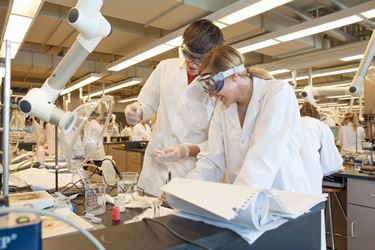Jill Scott discusses Teaching and Learning Action Plan
March 13, 2014
Share
The Provost’s Task Force on the Student Learning Experience recently released its Teaching and Learning Action Plan. A town hall meeting for the university community to discuss the plan is scheduled for March 18, from 2:30 to 4:00 pm in Ellis Hall room 333.
Jill Scott, Vice-Provost (Teaching and Learning), who co-chaired the task force with Brian Frank, Director of Program Development in the Faculty of Engineering and Applied Science, met recently with Senior Communications Officer Craig Leroux to discuss the action plan.
 Jill Scott, Vice-Provost (Teaching and Learning)
Jill Scott, Vice-Provost (Teaching and Learning)Craig Leroux: What is the Teaching and Learning Action Plan, and how did it come about?
Jill Scott: When the Provost created the Task Force on the Student Learning Experience he asked us to build on the recommendations of the Academic Plan and propose some actionable measures to strengthen teaching and learning at Queen’s. The Teaching and Learning Action Plan is the result of that work and it makes 15 recommendations to advance teaching and learning at Queen’s and to provide better support to our faculty, staff and students.
CL: What are some of the recommendations?
JS: The action plan aims to develop strong support services for faculty, staff and students, while encouraging innovation and improvement in teaching and learning. The task force felt very strongly about sustainability – we wanted to recommend investments rather than expenditures, actions that would have a lasting benefit at Queen’s.
Our recommendations include establishing a competitive teaching enhancement program that will support large-scale course redevelopment or small teaching innovation projects, enhancing first-year student transition programs, providing university-wide support for eLearning, and creating Queen’s-specific learning outcomes that are purposefully integrated into both curricular and co-curricular learning.
CL: In these times of budgetary constraints, how do you plan to fund these initiatives?
JS: The student learning experience is at the core of Queen’s mission, and these recommendations are strategic, cost-effective ways to advance teaching and learning. For some of the initiatives we are going to be looking for external funding of various sorts. We’re proposing some assessment programs that we hope to fund through grants, and we are also working with Advancement to get potential donors excited about some of our other initiatives.
 Students working in the lab as part of Chemistry 112, which is delivered in a blending learning format.
Students working in the lab as part of Chemistry 112, which is delivered in a blending learning format.CL: The report recommends university-wide support for online learning. Is this ultimately a cost savings measure?
JS: Developing high-quality online, or eLearning, courses and programs can require a significant investment of resources. What’s driving all forms of technology-enhanced learning at Queen’s is not cost savings. It’s about enhancement. The action plan calls for educational technology to be integrated in purposeful, evidence-based ways to enhance learning, and for university-wide support for eLearning.
The Continuing and Distance Studies unit in the Faculty of Arts and Science already does an excellent job of offering very high-quality and engaging courses online, and a number of other faculties are keen to expand their range of fully online courses and programs. eLearning can be of particular interest to prospective students looking to upgrade their credentials through graduate diplomas or professional master’s programs.
There is real potential for those people who are getting involved in both blended and fully online courses at Queen’s to become the leaders in teaching and learning. Because once you start working from an evidence-based approach, using learning outcomes and thinking deeply about student engagement, you are going to teach your face-to-face classes differently.
 Students seated in rolling chairs in one of Ellis Hall's active learning classrooms collaborate in a breakout group.
Students seated in rolling chairs in one of Ellis Hall's active learning classrooms collaborate in a breakout group.CL: The action plan doesn’t make any recommendations around teaching space. What role will active learning spaces like the new classrooms in Ellis Hall play at Queen’s?
JS: The report doesn’t make recommendations around learning space because the Campus Master Plan was already underway when we started our work, but it’s something I feel absolutely passionate about. We now have active and collaborative learning spaces in Ellis Hall and that’s a fantastic sandbox. Those spaces and the courses being delivered in them have received tremendous support from educational developers and educational technologists, but ultimately it’s about the magic that just happens when you get people into those spaces. We are studying how those spaces impact learning and the results will inform what the university does in the future around instructional space.
CL: What are your next steps?
JS: Professor Brian Frank and I are going out to faculty boards, student groups, and shared service units to have a dialogue about the action plan and get a sense of where people see themselves reflected in its recommendations. Ultimately, this is a document for everyone in the Queen’s community and we want people to engage with the aspects of it that resonate with them.
We also encourage anyone interested to attend the open house on March 18. We look forward to engaging discussions around the action plan and its recommendations.
Download the Teaching and Learning Action Plan
More about the Provost’s Advisory Task Force on the Student Learning Experience